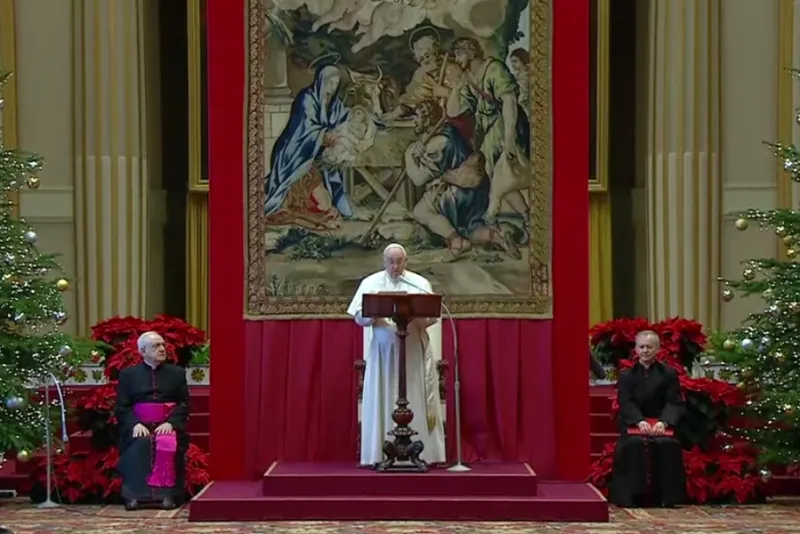
Vatican City, Dec 23, 2021 / 05:50 am (CNA).
Pope Francis urged Vatican officials on Thursday to undergo a “synodal conversion.”
In his annual pre-Christmas address to members of the Roman Curia on Dec. 23, the pope said that the Holy See’s administrative institutions should be a model for the worldwide Catholic Church.
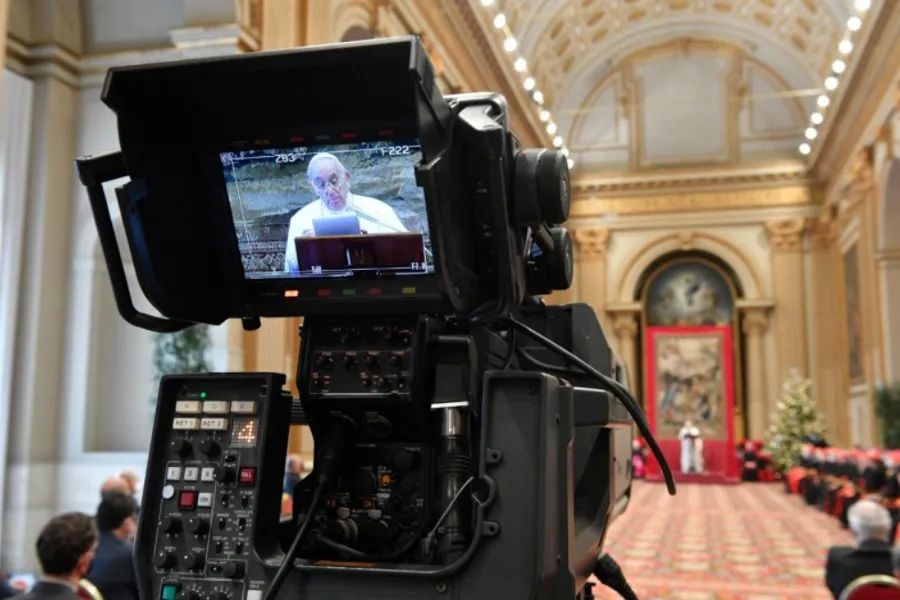
“The Curia — let’s not forget — is not merely a logistical and bureaucratic instrument for meeting the needs of the universal Church, but the first body called to bear witness,” he said.
“Precisely for this reason, it grows in prestige and effectiveness when it embraces in first person the challenges of that synodal conversion to which it too is called. The organization that we must adopt is not that of a business, but evangelical in nature.”
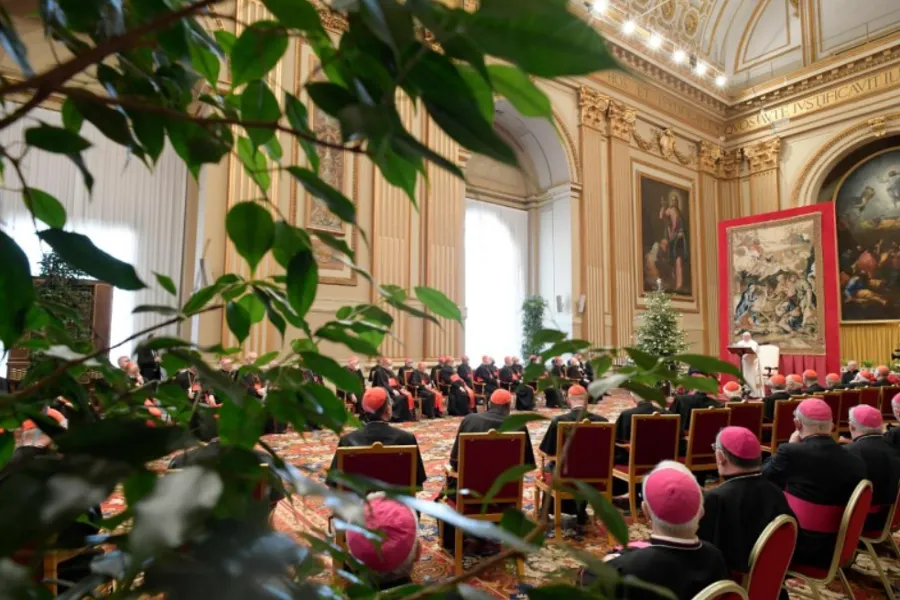
The pope has often used his annual December address to offer his frank perspective on the state of the Roman Curia and outline his vision for the coming year.
In 2014, he famously diagnosed 15 spiritual “diseases” afflicting the Curia, including careerism and idolizing superiors.
Then in 2015, he offered a “catalog of needed virtues” that curial officials needed for their service to be “more fruitful,” including humility, respect, honesty, and sobriety.
In 2016, he discussed various types of opposition to change in the Curia, including “malicious resistance,” which “hides behind words of self-justification and, often, accusation.”
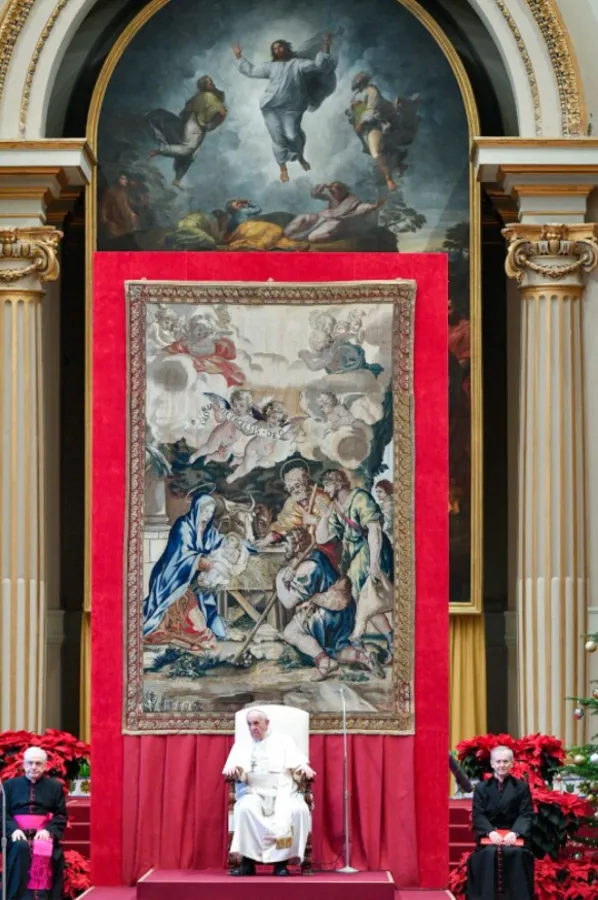
Last year, he stressed that there is a crisis that is calling the Church to renewal, using the word “crisis” 44 times in his speech.
This year, he underlined the importance of humility, using the word 36 times in his almost 4,000-word address.
“The mystery of Christmas is the mystery of God who enters the world by the path of humility,” he said during his live-streamed address.
“Our times seem either to have forgotten humility or to have relegated it to a form of moralism, emptying it of its explosive power.”
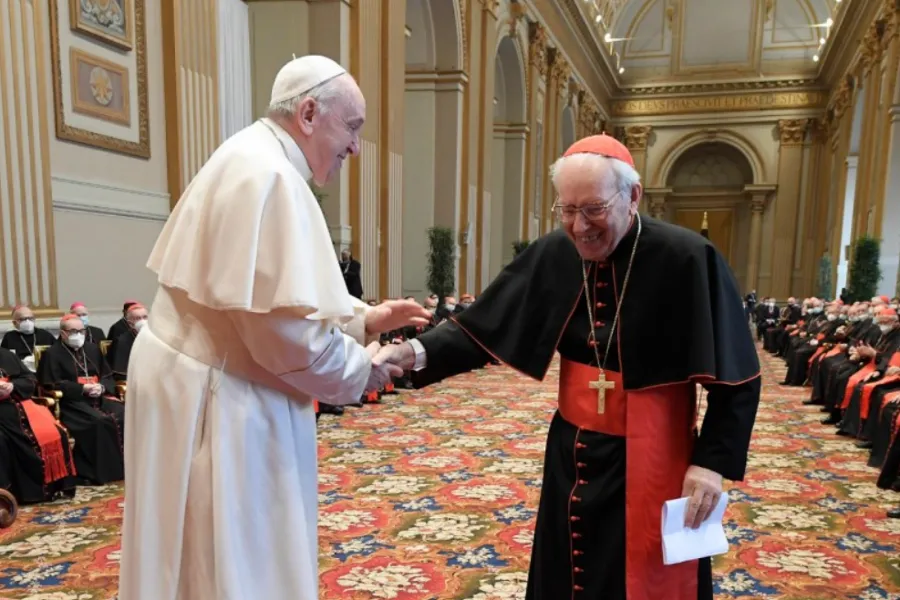
The pope’s traditional Christmas greetings, held in the Vatican’s gilded Hall of Benediction, began with a survey of 2021 by Cardinal Giovanni Battista Re, the dean of the College of Cardinals who served as prefect of the Congregation for Bishops from 2000 to 2010.
The 85-year-old pope then spoke in front of a large tapestry depicting the nativity of Christ. Poinsettia arrangements and Christmas trees with silver and gold baubles flanked him on either side.
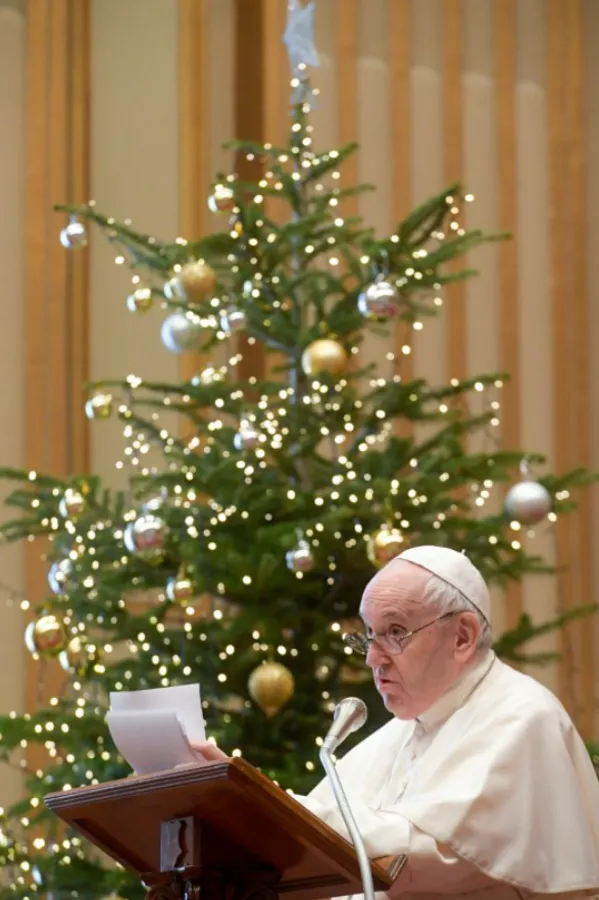
The pope reflected on the example of Naaman the Syrian, a celebrated army commander who is described in 2 Kings 5 as suffering from leprosy.
“His armor that had won him renown in reality covered a frail, wounded, and diseased humanity,” the pope said.
“We often find this contradiction in our lives: sometimes great gifts are the armor that covers great frailties.”
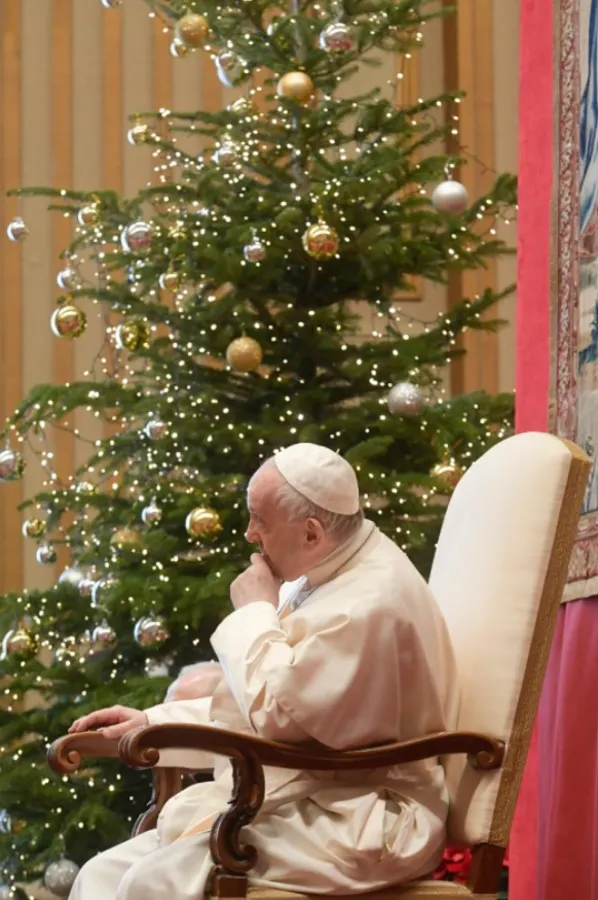
“Naaman came to understand a fundamental truth: we cannot spend our lives hiding behind armor, a role we play, or social recognition: in the end, it does harm. The moment comes in each individual’s life when he or she desires to set aside the glitter of this world’s glory for the fullness of an authentic life, with no further need for armor or masks.”
The pope noted that Naaman was helped to find healing by “a slave girl, a Jewish prisoner of war,” who directed him to the prophet Elisha, who advised him to disrobe and wash seven times in the Jordan River. Naaman resisted at first, but then removed his armor and did as the prophet suggested.
The pope said: “A great lesson, this! The humility of exposing his own humanity, in accordance with the word of the Lord, gained healing for Naaman.”
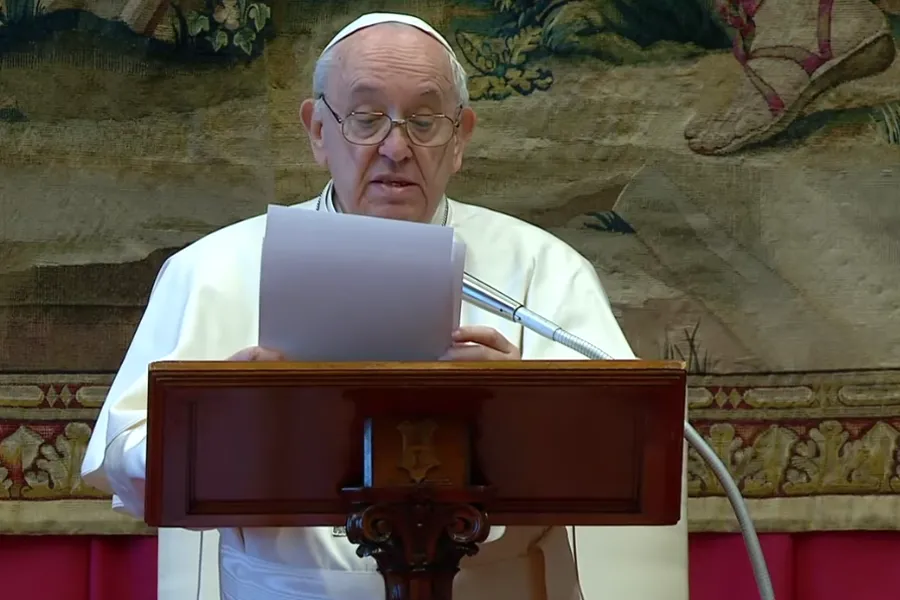
“The story of Naaman reminds us that Christmas is the time when each of us needs to find the courage to take off our armor, discard the trappings of our roles, our social recognition, and the glitter of this world, and adopt the humility of Naaman.”
He added: “Once we strip ourselves of our robes, prerogatives, positions, and titles, we are all lepers, all of us, in need of healing. Christmas is the living reminder of this realization and helps us to understand it more deeply.”
Pope Francis told the assembled cardinals and bishops that humility consists of recognizing our frailty and accepting it without shame.
He highlighted the danger of “spiritual worldliness,” which he described as a temptation that was hard to unmask “for it is concealed by everything that usually reassures us: our role, the liturgy, doctrine, religious devotion.”
“Lacking humility, we will look for things that can reassure us, and perhaps find them, but we will surely not find what saves us, what can heal us,” he commented.
“Seeking those kinds of reassurance is the most perverse fruit of spiritual worldliness, for it reveals a lack of faith, hope, and love; it leads to an inability to discern the truth of things.”
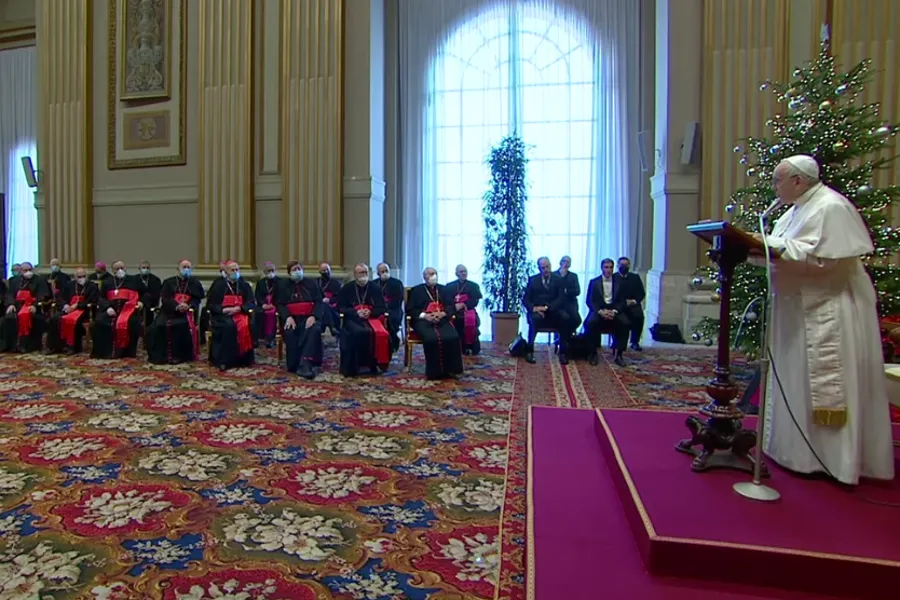
The pope recalled that in October, he formally launched a two-year “synodal journey” for the global Church.
“In this too, humility alone can enable us to encounter and listen, to dialogue and discern, to pray together, as [Cardinal Re] indicated,” he said.
“If we remain enclosed in our convictions and experiences, the hard shell of our own thoughts and feelings, it will be difficult to be open to that experience of the Spirit, which, as the Apostle says, is born of the conviction that we are all children of “one God and Father of all, who is above all and through all and in all” (Ephesians 4:6).”
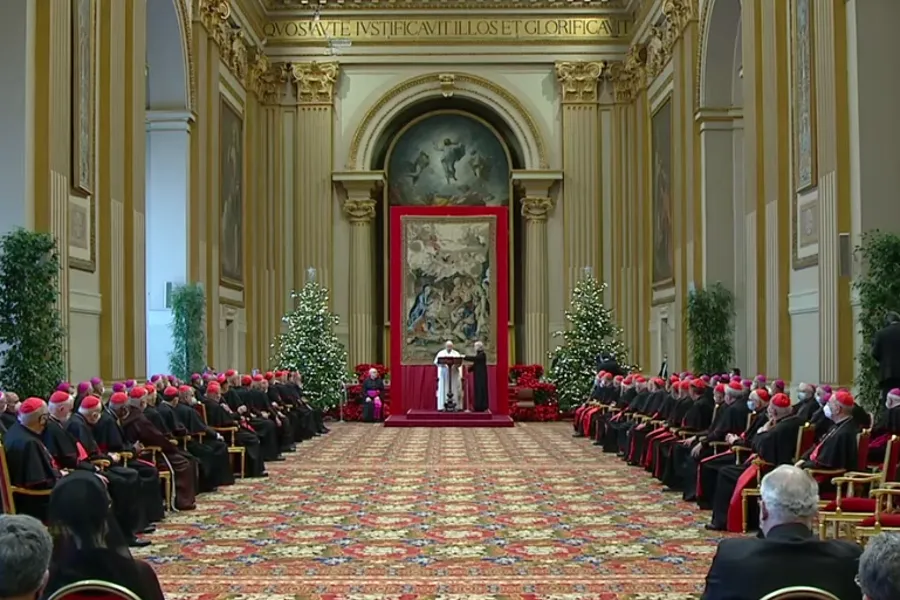
“That word – ‘all’ – leaves no room for misunderstanding. The clericalism that, as a perverse temptation, daily spreads in our midst, makes us keep thinking of a God who speaks only to some, while the others must only listen and obey.”
“The synod is the experience of feeling ourselves all members of a larger people, the holy and faithful People of God, and thus disciples who listen and, precisely by virtue of this listening, can also understand God’s will, which is always revealed in unpredictable ways.”
The Vatican announced in May that the synodal journey would open with a diocesan phase lasting from October 2021 to August 2022.
A second, continental phase will take place from September 2022 to March 2023.
The third, universal phase will begin with the XVI Ordinary General Assembly of the Synod of Bishops, dedicated to the theme “For a Synodal Church: Communion, Participation, and Mission,” at the Vatican in October 2023.
Pope Francis said it was wrong to think of the synod as “something abstract and distant from us.”
“Synodality is a ‘style’ to which we must be converted, especially those of us here present and all those who serve the universal Church by their work for the Roman Curia,” he said.
He urged curial officials to set an example for Catholics worldwide.
“For this reason, if the word of God reminds the whole world of the value of poverty, we, the members of the Curia, must be the first to commit ourselves to being converted to a style of sobriety,” he said.
“If the Gospel proclaims justice, we must be the first to try to live transparently, without favoritism or cliques.”
“If the Church follows the path of synodality, we must be the first to be converted to a different style of work, of cooperation and communion. All this is possible only by following the path of humility. Without humility, we will not be able to do this.”
The pope noted that in his address opening the synodal assembly on Oct. 9, he emphasized the words “participation, communion, and mission.”
“These words are the three requirements that I would like to indicate as a style of humility at which we here in the Curia should aim,” he said.
The pope explained that participation could be encouraged “through a style of co-responsibility.”
He said: “I am always struck whenever I encounter creativity in the Curia — I like it a lot — and not infrequently, this occurs especially where room is made and space found for everyone, even those who appear, hierarchically, to occupy a marginal place.”
Communion, he emphasized, is rooted in Christ.
“Many of us work together, but what builds communion is also the ability to pray together, to listen together to God’s word, and to construct relationships that go beyond work and strengthen beneficial relations by helping one another,” he observed.
“Otherwise, we risk being nothing more than strangers working in the same place, competitors looking to advance or, worse yet, forging relationships based on personal interests, forgetting the common cause that holds us together.”
“This creates divisions, factions, and enemies, whereas cooperation demands the magnanimity to accept our own partiality and to be open to working in a group, even with those who do not think as we do.”
He urged Vatican officials to have “a heart open to mission” and dedicated to serving poor.
He said: “The Church is summoned to reach out to every form of poverty. The Church is called to preach the Gospel to everyone, since all of us are poor; all of us are, in one way or another, needy. But the Church also reaches out to the poor because we need them: we need their voice, their presence, their questions, and criticisms.”
Concluding his address, the pope said: “Dear brothers and sisters, mindful of our own leprosy, and shunning the worldly thinking that deprives us of our roots and branches, let us allow ourselves to be evangelized by the humility of the Child Jesus.”
“Only by serving, and by seeing our work as service, can we be truly helpful to everyone. We are here — I myself before anyone else — to learn how to kneel and adore the Lord in his humility, not other lords in their empty trappings. We are like the shepherds, we are like the Magi; we are like Jesus.”
“This is the lesson of Christmas: humility is the great condition for faith, for the spiritual life, and for holiness.”
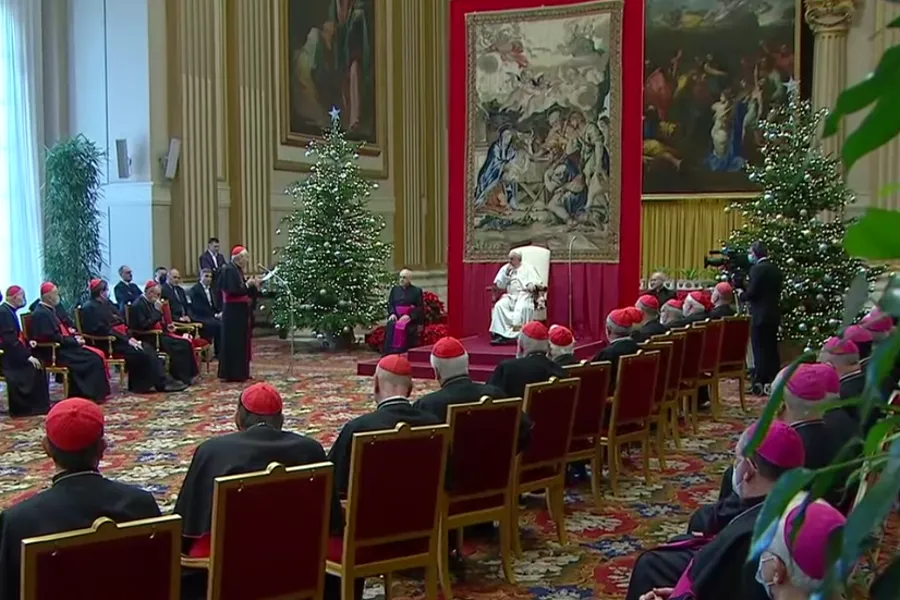
Following his custom, Pope Francis gave Vatican officials books as a gift.
The first, “Converting Peter Pan,” was written by Msgr. Armando Matteo, an undersecretary at the Congregation for the Doctrine of the Faith. The pope described it as a “provocative” book focused on “the fate of faith in this society of eternal youth.”
The second, “The Discarded Stone: When the Forgotten are Saved,” was written by the Italian priest Father Luigi Maria Epicoco. The pope said that the book, intended “for meditation, for prayer,” had reminded him of the story of Naaman the Syrian.
The third book, “The Abused Word,” is “a reflection on gossip,” written by the Nigerian Archbishop Fortunatus Nwachukwu, appointed Permanent Observer of the Holy See to the United Nations in Geneva on Dec. 17.
After his address to the Curia, Pope Francis greeted employees of the Holy See and Vatican City State in the Paul VI Hall, where he holds general audiences.
He urged them not to neglect the elderly and to take special care of their grandparents, “because this throwaway culture always leaves them aside.”
He also encouraged them to turn for help in their difficulties to St. Joseph.
“As you know, this entire year has been dedicated to St Joseph: I was very happy about this, and I hope it has helped you to feel him closer, more present in your lives, in your families,” he said.
“To him you can entrust certain situations that are a bit complicated, in which you realize that our strength is not enough, that there are no solutions at hand. Then you can turn to St. Joseph in prayer.”
“He is one of few words — in the Gospel, he never speaks, there are no words of Joseph — of few words but of many deeds. Try it. A man who listens to the will of God and puts it into practice, without hesitation. I always pray to him, for this need, that need, that need, and he always answers.”
If you value the news and views Catholic World Report provides, please consider donating to support our efforts. Your contribution will help us continue to make CWR available to all readers worldwide for free, without a subscription. Thank you for your generosity!
Click here for more information on donating to CWR. Click here to sign up for our newsletter.







Remember the Pillsbury Dough Boy?
He wore a smile.
Otherwise, what’s the difference?
And who will convert the free-form synods, including agnostics and even atheists (the vanedecum)? Perhaps the “facilitator” bishops?
At the beginning of the last century the challenge was threefold: agnosticism, immanentism and evolutionism. The challenge today is said to be scorched-earth reform of clericalism–but without falling into the basket of synodal immanentism?
Curious to see what role the Congregation for the Doctrine of the Faith still will have under the reform of the curia…
Pope Francis needs Christian conversion.
Who needs Apostolic moralism when we Synodal converts restore the explosive power of our forgotten humility? Marchon, marchon great Synod. A great impresario that Francesco.
What a wonderful message here from Pope Francis. If our spiritual exercises are mere role-playing egotistical activities we will “not allow ourselves to be evangelized by the humility of the Child Jesus.”
Jumpin Jiminy! By what marvel of discernment does one distinguish that their spiritual exercises are mere role-playing egotistical activities rather than the explosive power of a restored humility? Is it the magnitude of corrections that one offers to others?